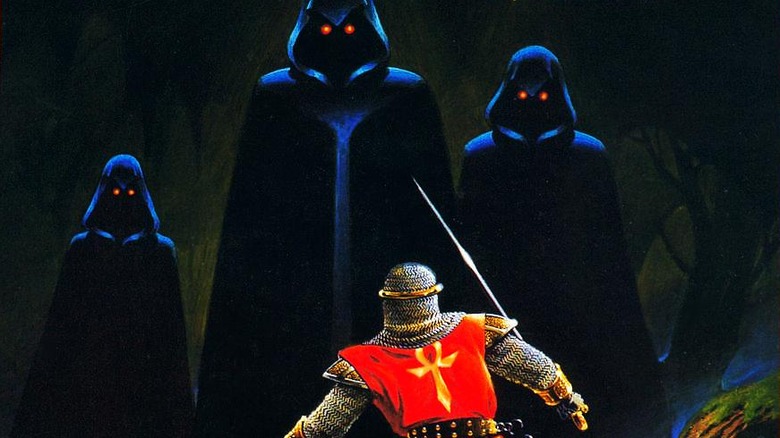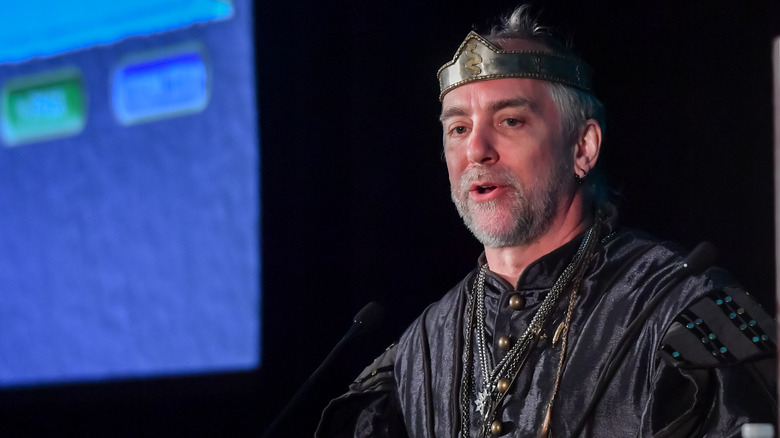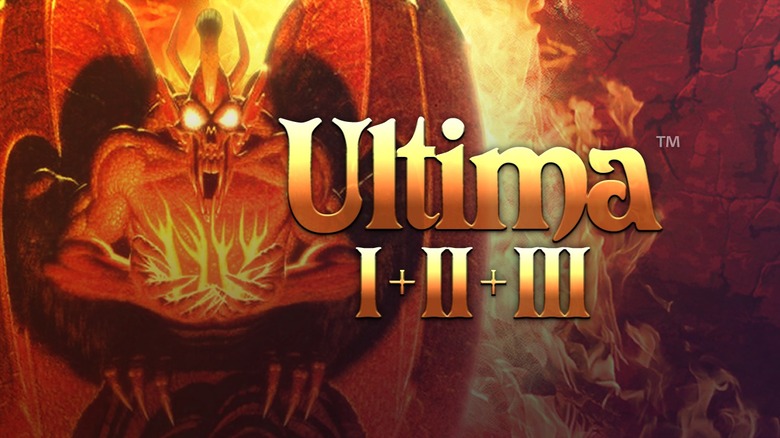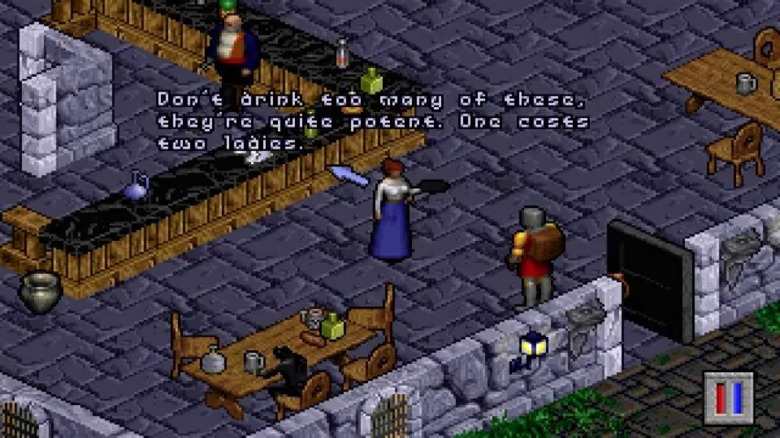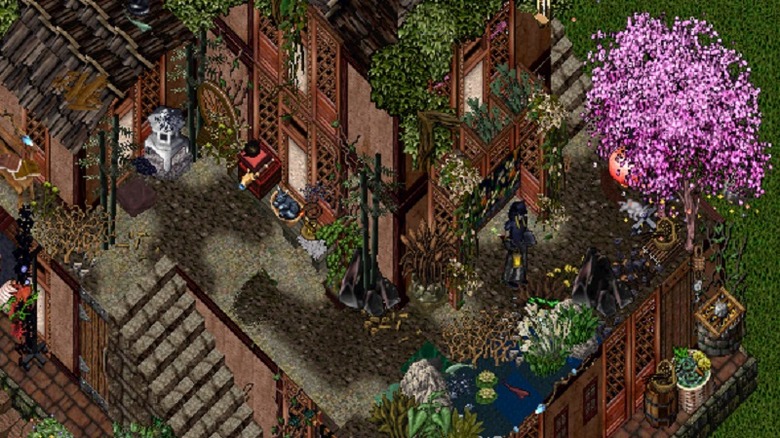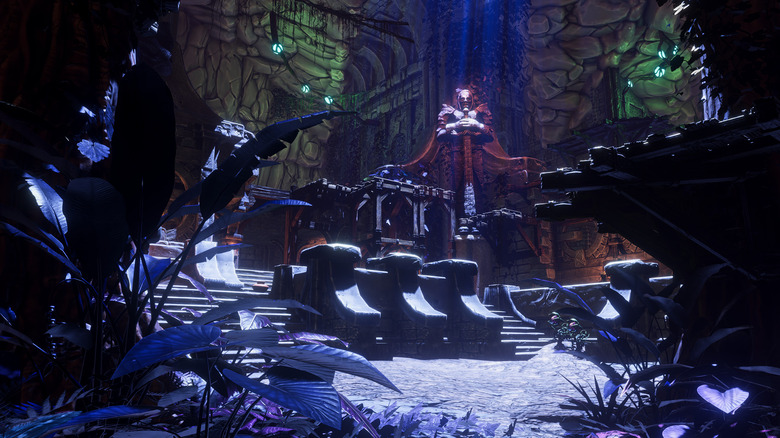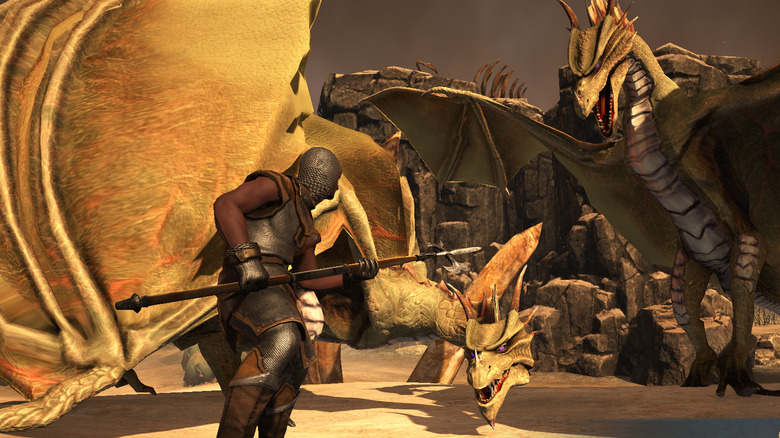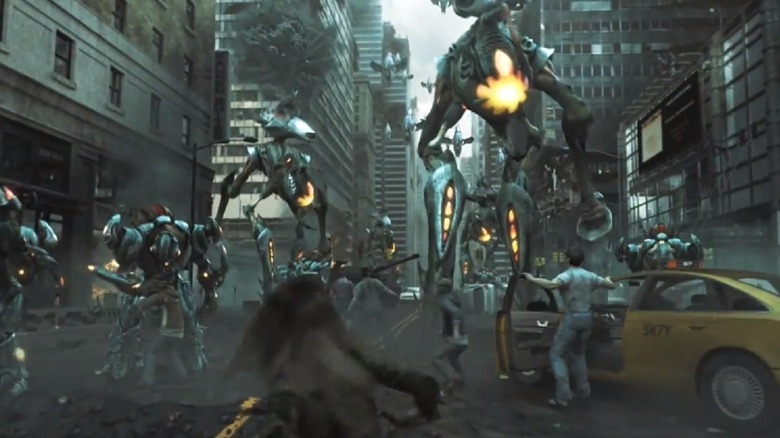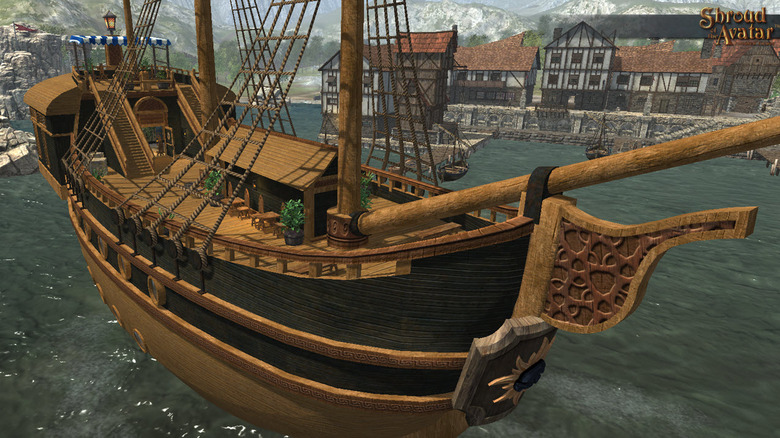Whatever Happened To The Ultima Game Series?
The Ultima series is one of the PC's most influential collection of games. The first official Ultima game was released in 1981, and it has been cited as one of the most important game series of all time. In a retrospective article on Ultima's legacy, Endgadget wrote, "If you're playing an open-world game, you're dealing with Ultima. If you're playing a massively-multiplayer game, you're dealing with Ultima. If you're playing a game with a morality system, Ultima. Even something as simple as three-dimensional graphics – either in perspective or overall representation – have ties to Ultima." The license is currently owned by EA, one of the biggest publishers in the world. And the creator of the series, Richard Garriott, is also still working in game development.
How could this legendary series, which is still being imitated and cited as a major influence, no longer be a part of modern gaming culture?
Today, we're going to take a look at the Ultima series, how it has impacted modern gaming, and where the problems lie in creating another entry. Read on, noble Avatar: Lord British commands it (probably)!
Richard Garriott, aka Lord British, began game development at an early age
Richard Garriott is the creator of the Ultima series, which he began laying the foundations for as a high school student. Encyclopedia Britannica writes that Garriott grew up the son of astronaut Owen Garriott, and always dreamed of exploring new worlds. His love of tabletop roleplaying games grew from that idea, and the first Ultima games were his attempts to bring pen and paper RPGs to computers. He credits his first computer RPG, Akalabeth, as an unofficial Ultima 0, laying the groundwork for what would later expand into the massive world of Ultima.
Just as Garriott ruled the roost over the creation of the Ultima games, he also "rules" inside them. Lord British is the in-game alter ego of Richard Garriott and is practically invincible. He is generally a good and noble ruler who was transported to the land of Sosaria from Earth, where he quickly took a stand against the evil Mondain and began his rise to eventual kingship. He is almost always a guiding force for the player character, known as "The Avatar," on their various quests throughout the games.
What are the Ultima games all about?
The core Ultima games consist of three different trilogies, with each comprising a different period of history in the world of the series.
The first trilogy is known as the "Age of Darkness," and they laid the groundwork for what the series would become. USgamer calls the first game in the series "the first commercial video game release to capture the essence of D&D." The first three games are considered fairly standard hack 'n' slash entries in the series, with the third game, Exodus, standing out as the first that you can't simply brute force your way through.
The second trilogy of games, known as the "Age of Enlightenment," is where the series started to introduce systems that are still utilized by the industry today. Core in those was the morality system: the player was expected to be an embodiment of virtue, and Garriott wanted players to experience that. He said, "Ultima IV I wanted to be a very personal experience. The reason is because in most of these games you are the puppeteer running this puppet around the world. If this puppet is doing bad things it's not you, it's the puppet. You can detach. And I wanted this game to be about personal and social responsibility."
The third trilogy, the "Age of Armageddon," is fittingly titled. Although PC Gamer calls Ultima VII the greatest video game RPG ever, the next two titles were not received quite as well. What went wrong?
Ultima VIII begins the downfall of the series
Whereas Ultima VII: The Black Gate is often lauded as an example of a "perfect" video game RPG, its success caused the Ultima boat to start rocking. Garriott's development company, Origin Systems, drew the eye of Electronic Arts. On September 10, 1992, they purchased the company and, with it, the Ultima license. You might think this would be good for a series that was building giant, open worlds and developing intricate storylines, but it did not quite work out that way.
PC PowerPlay snarkily writes, "After seven acclaimed games and Ultima VIII: Pagan, Garriott and his team took five years and four distinctly different approaches to release a buggy mess [Ultima IX: Ascension]. Along with its technical failings, the game played fast and loose with its own lore, angering and alienating even those fans who endured the terrible gameplay."
Garriott himself even weighed in on the two games in 2013, citing Ultima VIII's problem as "being forcibly badly slashed and shipped," and Ultima IX's as having "no corporate support."
Ultima Online is still going strong
Did you know that Ultima Online is still running? First released in 1997, it is still going strong: Electronic Arts last released an expansion for it in 2015, even though the core game predates even EverQuest and World of Warcraft. It seems fitting that Garriott, who grew up loving tabletop RPGs like Dungeons & Dragons, would want to create a world where a group of people could each control their own character and influence events in a larger game world. With UO, he effectively invented the modern MMO format, including the idea of a subscription fee.
Ultima Online manages to keep a persistent player base, despite the fact that it is one of the few MMOs to still use a subscription model. In a retrospective on the game, Rock Paper Shotgun may have summed up best just how this game keeps rolling: "Player-created civilizations, unique monsters, and the sheer mystery of the world combine to keep this ancient MMO compelling. ... For all the ways in which the genre has improved, Ultima Online remains one of just a few MMOs that let you live an alternative life."
What is EA doing with the Ultima license?
In March of 2000, Richard Garriott left Origin, which put the Ultima series in limbo. EA still owned the rights to it, but it is always difficult to continue on without the original mastermind. Garriott was left trying to create Ultima games but without the rights to the Ultima lore that he had spent decades building up. Electronic Arts is not a company known to sit back and not make money, however, so they have put their license to ... decent use.
Mainly, they have done this in the form of Ultima Online expansions. When the game was still new, EA would release expansion content on an almost yearly basis. Those have slowed down as the game has aged, but there have been seven total expansions and three "anniversary" editions since Ultima Online's 1997 release.
EA still holds onto the license, but they did give OtherSide Entertainment partial rights to create a sequel to 1992's spinoff Ultima Underworld: The Stygian Abyss, called Underworld Ascendant. OtherSide's founder, Paul Neurath, helped work on those original games as well as the Thief series and System Shock 2.
Why can't Garriott and EA just get along?
Even though things were a bit rocky with Ultima VIII and Ultima IX, you would think that Garriott, who clearly loves the series, and EA, who would get great PR from a new Garriott-made Ultima game, would be able to figure things out. Not so, according to the legendary developer.
In an interview with Gamezone, Garriott claims he speaks with EA every year about creating a new Ultima game: "And every time I called their executives go, 'Yeah. That's a great idea!' And then they shop it around internally, and there's always some group internally that goes, 'No. Someday, I'm gonna use it.' And so EA understandably favors their in-house studios, and so the potential deals have fallen apart every time."
Fans speculate that EA does, in fact, plan on releasing an Ultima game in the future, and that is why they have been so careful with what happens to the license. It seems doubtful that EA would get much fan support without Garriott behind the project, especially because he has created a few Ultima-style games without it. However, those games haven't always gone according to plan.
The sad tale of Garriott's follow-up, Tabula Rasa
Garriott's attempt to replicate the success of Ultima Online with a new IP took shape with 2007's Tabula Rasa. A science-fiction MMO, created by the genius behind the Ultima series, backed by publisher NCsoft? What could possibly go wrong?
Funny you should ask that.
PCPowerPlay's retrospective on Tabula Rasa is subtitled "A Tale of Hubris and Catastrophe." Less than two years after the game released, the servers closed down.
Garriott shoulders a lot of the blame for what went wrong with the title, but it is clear he is somewhat bitter about how things turned out. He tells Eurogamer that they tried working with the publisher behind Lineage, then the biggest MMO in the world. After two years, the development team realized the partnership was not working, and moved to NCsoft. He said: "Whenever you start a game that is two years out of position, you're basically already up a creek, if you know what I mean. ... You basically are two years late and what's taking you so long – let's get the game out. So Tabula Rasa started its two-year late restart under exceptionally unusual pressures and with understandable corporate discontent, which made it very difficult to finish."
Tabula Rasa, despite solid reviews, never recovered. However, Garriott came out a winner: he sued NCsoft over the way they handled his firing. According to Gamepro, the lawsuit netted him $28 million.
Let's not put all the blame on Garriott's publishers
Although it sounds like Garriott has had some bad luck with publishers, that might not be entirely on them. Although he is a legendary game developer, it seems like he may not be the easiest person to work with. In an interview with PC Gamer, Garriott offered a frank critique of modern game development:
"I was a pretty good programmer, but now all of our programmers are better than I am—but if I'd stayed in programming I could probably keep up. But other than a few exceptions, like Chris Roberts, I've met virtually no one in our industry who I think is close to as good a game designer as I am. I'm not saying that because I think I'm so brilliant. What I'm saying is, I think most game designers really just suck, and I think there's a reason why."
He goes on to explain that many designers are people who like video games, but lack the skills to create them in other areas. Therefore, he says, a lot of people with just a small amount of talent wind up becoming designers.
We aren't saying he's wrong, but it's pretty tough to go on the record with a take like that and come off looking humble. Would you want to work for him?
Is there any hope for the Avatar's return?
All this information amounts to this: we wouldn't hold our breath for an official Ultima follow up anytime soon. There is, as of now, no word from EA about the series returning. However, we do have a few spiritual successors if you really want to get back into that world.
The first is the aforementioned Underworld Ascendant. It is scheduled to release in September of 2018. Keep in mind this is a spiritual successor to a spinoff series of Ultima, so it won't be quite the same style.
Your other option is Richard Garriott's upcoming project, Shroud of the Avatar: Forsaken Virtues. You can jump into it now: it is an MMO that is even listed on its Steam page as a "spiritual successor to Richard Garriott's Ultima games."
It would be a shot of nostalgia if there was a return to Britannia in the cards, but it may be better for everyone if EA just sits on that license. Maybe they will come to an agreement with Garriott someday. Or maybe he'll just go start a colony in space or something like that.

